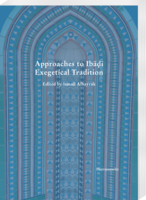|
weitere Titel zum Thema:
Download:
Bitte beachten Sie: Mit digitalen Produkten in Ihrem Warenkorb
wird die Bezahlung nur per PayPal möglich. Der Download dieser Produkte wird bereitgestellt, wenn die Bezahlung bestätigt ist. Ibāḍīs are a minority Muslim group whose history goes back to the early period of Islam. Today they mainly live in Oman, Zanzibar, and some parts of North Africa (Algeria, Tunisia and Libya). A long-lasting cliché that associates Ibāḍīs with early Khārijites (puritans and fanatics) creates a great impediment in understanding this group. Although in recent years literature about the origins, socio-economic, political, theological and intellectual history of the Ibāḍīs has been growing rapidly, there are very few studies on their history of Qur’an exegesis.
This study by İsmail Albayrak analyzes various approaches to Ibāḍī exegetical tradition to find an answer to the following questions: How different are Ibāḍī exegeses compared to mainstream Muslim exegetical tradition? Can one talk about particular Ibāḍī exegetical methodologies? Why Ibāḍīs have produced so little in this genre? How diverse is the Ibāḍī exegetical tradition with special reference to the notion of ‘return of Jesus’? Using the main and updated Ibāḍī sources, the book contributes not only to the exegetical and theological understanding of Ibāḍism but also to its history, politics, culture, geography, sociology, folklore and anthropology. Beyond that, the study shows that Ibāḍī groups were not immune to the pressures of modernity and reacted in a similar manner as other Muslim communities regarding many issues. |
|||||||||||||||||||||||||||||||||||






